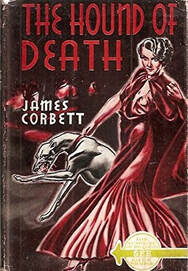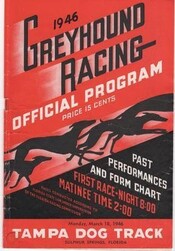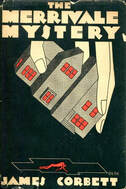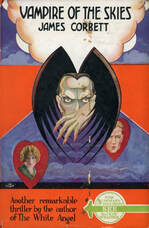
But then, I shouldn’t be too surprised: one would have to actively work at one’s ignorance to keep writing and still maintain the level of ineptness on display at chez Merrivale. I wondered why William F. Deeck, who was so delighted with/repulsed by this author’s skill set, primarily quoted from only four early titles when making his case for (or against) Corbett. I know now that it is likely because the truly so-bad-it’s-good material is delivered early in the author’s career. And that’s understandable, if a little disappointing, since Corbett can be positively inspired when he reaches his unparalleled heights of poor writing.
Here, we start with Detective-Inspector Jimmy Brigg, a “burly man” with “a fighting chin”, “whimsical grey eyes”, and “strong, capable fingers”, surveying the grounds at the greyhound track. He is collecting information from the bookies about Colonel Trevor, a racing regular who recently killed himself with a revolver. A mysterious dog named “Black Shadow” runs and wins a race, and moments later a man collapses and dies. The astute detective notices there is a recent scratch on the dead man’s hand.
A journalist acquaintance of Brigg’s named Cardew (whose Christian name is also Jimmy for some reason) smells a story and sticks to Brigg, who chooses to give the reporter access to the investigation. During the case, Cardew meets the lovely Cora Dainton, the deceased Colonel Trevor’s niece, and soon Cora is menaced by a “Hindu” in a turban, while the gallant Cardew must fend off a bedroom cobra attack by shooting the snake, which was clearly intended for the ingénue. DI Brigg also keeps his whimsical grey eye on a night club singer, an entertainment manager, a spiritualist who owns the black greyhound, and a pair of on-the-lam racetrack gamblers, and by the book’s climactic séance scene (along with three pages of block explanation from Brigg to tie everything up) the detective has caught his criminal and the reporter has acquired a fiancée.
All in all, comprehensible if disposable genre fare, and Corbett’s approach is suitably melodramatic and stereotypical to make it all feel rather artificial. Here and there, I still found examples of the memorable floridness and not-quite-right wording of the maestro’s early works, as with this description:
Than the hard-boiled Detective-Inspector Brigg, C.I.D., New Scotland Yard, there was no one more prosaic. And as for Jimmy Cardew, wide-ranging reporter, blessed with both innate and hardly-acquired good horse-sense – his very profession had made him more than ordinarily skeptical. Yet both men experienced at the same time a sudden chill, a dampening, deadening influence that seemed to lay a clammy hand upon them. “Haunted!” said Cardew beneath his breath, and strove to laugh at himself, but his forced mirth made him uneasy. Brigg stopped and looked at him curiously.
“Did you say anything, Jimmy?”
“I did not.” Cardew was terse. “I was thinking, instead.”
“Interesting,” said Inspector Brigg.
The pathologists had got it at last – an obscure Afghan poison with some unholy name that he couldn’t pronounce. A clear case of murder, if ever there was one… The effect of this blasted stuff, if one could read between the lines of the mess of high falutin’ technical language was that it brought about an intense depression in the mind of the victim. First, of course, the poison worked its way into the blood-stream via a scratch on the surface of the skin; then it gradually had an insidious and deadening effect on the nerves.

But who am I to complain? I made it through another JC thriller, betting on The Hound of Death. And if it didn’t exactly win the long shot, it also didn’t stumble spectacularly from the moment it left the starting gate. All in all, not bad for a day at the James Corbett races.


 RSS Feed
RSS Feed